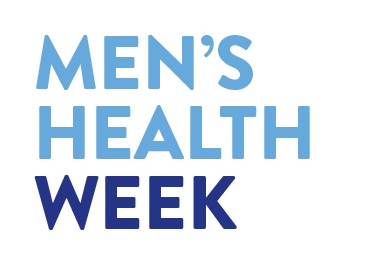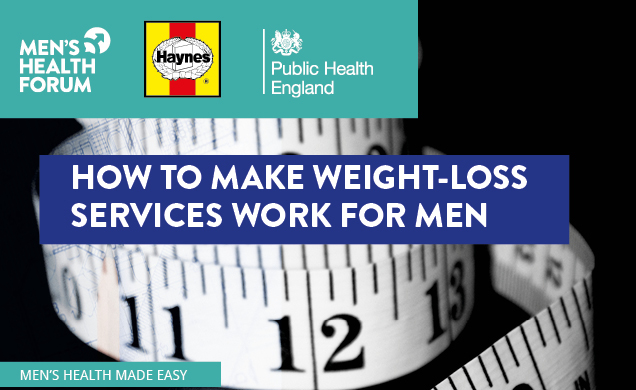The Men's Health Forum, supported by Public Health England has published 'How to make weight-loss services work for men', the first best practice to show how to adapt and run weight-loss programmes so they are tailored specifically for men.
- Top tips
- Survey for local public health teams
- Download How to make weight-loss services work for men
- Buy How to Make Weight-Loss Services Work for Men (How to Guides)
- Order Eat. Drink. Don't diet, the man manual
The need to tackle overweight and obesity is one of the greatest challenges facing the NHS. More men than women are overweight but men typically make up less than a third of those attending weight-loss programmes regardless of whether those programmes are delivered by the NHS or by commercial providers.
In 2012, the National Institute for Health Research funded a major review of the evidence about men’s engagement with weight-loss programmes. The findings from that review have provided reliable indicators of ‘what works’ in encouraging men to take part in such programmes.

This ‘How To…’ Guide condenses the findings from that review into practical, user-friendly advice for those whose job it is to design and deliver services to tackle overweight and obesity.
Obesity increases the risk of many serious illnesses, such as heart disease, cancer, diabetes and osteoarthritis. It is estimated that weight-related problems could cost the NHS £6.4 billion a year by 2015. Men are much less likely than women to take part in programmes to help them lose weight, despite the fact that more men than women are overweight or obese in the UK.
Andy Garlick, who runs Shape Up, a free 12 week weight management course for men delivered by Watford FC’s Community Sports and Education Trust, said:
The ‘How to make weight loss services work for men’ was extremely useful when designing our men’s weight management intervention. This ‘How to’ guide, like all the others in the series has the right ratio of research grounded theory to practical useable advice. It addresses the obstacles to engaging with men, then, unlike many other ‘guides’, actually lays out what works for men and how to implement this. We used these pointers to shape both the content, tone and delivery method of the education sessions. It was a valuable instruction manual, that allowed us to avoid some easy mistakes early on in the programmes that we otherwise might have made.
ISBN: 978-1-906121-16-7
Men are often considered ‘hard to reach’ when it comes to health. The Men’s Health Forum’s ‘How To…’ Guides give you the blueprint to change that.
Titles in the 'How To…' series so far
- How To Make Weight-Loss Services Work For Men
- How To Engage Men in Self-Management Support
- How to Make Mental Health Services Work For Men
Want the training to go with the guides?
Introduction
During 2012 and 2013, a research group at Aberdeen, Bournemouth and Stirling Universities conducted a systematic review of the evidence relating to the treatment of obesity in men. The review was funded by the National Institute for Health Research and led by Professor Alison, Clinical Chair in Health Services Research in Aberdeen's Health Services Research Unit. The Aberdeen review is the first such evidence review to be undertaken and is likely to remain the definitive analysis of this topic for some time to come. The published review runs to several hundred pages. Information about the Aberdeen review.
In 2011, 65% of men had a BMI of 25 or more compared with 58% of women. Yet men make up only 10% - 30% of participants on weight management programmes whether these are provided by the NHS or the commercial sector.
The review sought to establish whether weight loss programmes should be designed differently for men and to pin down "what works" in encouraging men to take part in weight loss programmes. It was particularly focused on those programmes that showed that they could help men lose weight in the long term and keep that weight off. It also looked at the evidence about where and how weight loss services should be delivered to make them more attractive to men. This summer, the Men's Health Forum will publish a handbook that takes the findings from the Aberdeen review and condenses them into a practical guide for people designing, delivering or commissioning weight loss services. It will help local service providers create weight loss programmes that encourage male participation and are as effective as possible in achieving positive outcomes for men. The handbook will not concentrate on "men only" weight loss programmes. It will be equally useful to those aiming to put on mixed programmes but who want to make sure they work equally well for both sexes.
The Equality Act 2010 requires providers of public services both to "advance equality of opportunity" between the sexes and to "eliminate unlawful discrimination" (this is intended to include indirect discrimination). This means in practice, that health service providers should aim to achieve service uptake and health outcomes that reflect health need. In other words, providers should be aiming at least to equalise the numbers of men and women on publicly funded weight loss programmes.
The handbook will be as evidence-based as it is possible to be within current knowledge on this topic. The Aberdeen review was able to pick out those strategies that have been shown to work well and – equally usefully – it was able to identify those things that have been tried and have been found to be less effective. At the same time, because one of the things shown by the review is that the research base is still relatively limited, there is still plenty of scope to try out new ideas in programme development. The handbook should help ensure that those new ideas have the greatest chance of success.
The handbook will also include advice about evaluation. At the Men's Health Forum, we have been acutely aware that many local health improvement programmes aimed at men over the past ten or fifteen years have been dependent on short term funding and driven by local enthusiasm. Often these programmes are never written up. That means - sadly - that good practice can be lost forever. It also means that programmes that do not work well are sometimes repeated elsewhere when people have the same idea in a different location. This is a waste of valuable resources and dispiriting for organisers. Published evaluations can prevent this happening. The handbook will therefore offer advice about the kind of data that should be collected and published. The relative shortage of good data encountered by the Aberdeen team demonstrates the need to ensure that programmes are properly evaluated and their outcomes published. This is important even where programmes are small-scale and time-limited. If programmes don't take evaluation seriously, progress towards effective interventions will be unnecessarily slow - and gender-sensitive planning will never become mainstream. In this case that means that men will keep getting heavier and many men will die years before their time.
Best practice tips
This list of "tips" is a brief preview of some of the guidance that appear in the handbook. Remember, all these tips are fully supported by a systematic review of the evidence conducted by Aberdeen University.
Developing the best practice tips and guide was part of the Men's Health Forum's work as a strategic partner of the Department of Health, NHS England and Public Health England. Production of the guide and related work is supported by Public Health England.
The Aberdeen review project was funded by the NIHR Health Technology Assessment programme (project number 09/127/01) and will be published in full in the journal Health Technology Assessment in late spring 2014. See the HTA programme website for details. The views and opinions expressed therein are those of the authors and do not necessarily reflect those of the Department of Health.


